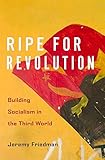Ripe for Revolution : Building Socialism in the Third World / Jeremy Friedman.
Material type: TextPublisher: Cambridge, MA : Harvard University Press, [2022]Copyright date: ©2021Description: 1 online resource (352 p.)Content type:
TextPublisher: Cambridge, MA : Harvard University Press, [2022]Copyright date: ©2021Description: 1 online resource (352 p.)Content type: - 9780674244313
- 9780674269743
- Globalization -- Developing countries
- Globalization -- Southern Hemisphere
- Socialism -- Developing countries
- Socialism -- Southern Hemisphere
- HISTORY / Modern / 20th Century
- Angola
- Chile
- China
- Cold War
- Global South
- Indonesia
- Iran
- Islamism
- Marxism
- Socialism
- Soviet Union
- Tanzania
- Third World
- anti-imperialism
- authoritarianism
- capitalism
- decolonization
- democracy
- development
- markets
- planning
- revolution
- 335.009172/4 23
- HX517.8 HM1131
- online - DeGruyter
| Item type | Current library | Call number | URL | Status | Notes | Barcode | |
|---|---|---|---|---|---|---|---|
 eBook
eBook
|
Biblioteca "Angelicum" Pont. Univ. S.Tommaso d'Aquino Nuvola online | online - DeGruyter (Browse shelf(Opens below)) | Online access | Not for loan (Accesso limitato) | Accesso per gli utenti autorizzati / Access for authorized users | (dgr)9780674269743 |
Browsing Biblioteca "Angelicum" Pont. Univ. S.Tommaso d'Aquino shelves, Shelving location: Nuvola online Close shelf browser (Hides shelf browser)

|

|

|

|

|

|

|
||
| online - DeGruyter Time of Anarchy : Indigenous Power and the Crisis of Colonialism in Early America / | online - DeGruyter Soldiers of God in a Secular World : Catholic Theology and Twentieth-Century French Politics / | online - DeGruyter Killer Instinct : The Popular Science of Human Nature in Twentieth-Century America / | online - DeGruyter Ripe for Revolution : Building Socialism in the Third World / | online - DeGruyter Klimat : Russia in the Age of Climate Change / | online - DeGruyter The Anatomy of Racial Inequality : With a New Preface / | online - DeGruyter Political Cleavages and Social Inequalities : A Study of Fifty Democracies, 1948–2020 / |
Frontmatter -- CONTENTS -- Introduction: Socialist Revolution as a Global Process -- 1. Asian Axis: The Indonesian Communist Party and the Struggle for Power in Sukarno’s Indonesia -- 2. Democratic Communism: Allende’s Chile and Peaceful Transition -- 3. Tanzanian Ujamaa : Building Socialism in a Communist World -- 4. Lenin without Marx: Communism Comes to Angola -- 5. Opiate of the Masses, or Stimulant? Socialism, Religion, and Revolution in Iran -- Conclusion: The Evolution of Socialism -- Archive Sources -- Notes -- Acknowledgments -- Index
restricted access online access with authorization star
http://purl.org/coar/access_right/c_16ec
A historical account of ideology in the Global South as the postwar laboratory of socialism, its legacy following the Cold War, and the continuing influence of socialist ideas worldwide. In the first decades after World War II, many newly independent Asian and African countries and established Latin American states pursued a socialist development model. Jeremy Friedman traces the socialist experiment over forty years through the experience of five countries: Indonesia, Chile, Tanzania, Angola, and Iran. These states sought paths to socialism without formal adherence to the Soviet bloc or the programs that Soviets, East Germans, Cubans, Chinese, and other outsiders tried to promote. Instead, they attempted to forge new models of socialist development through their own trial and error, together with the help of existing socialist countries, demonstrating the flexibility and adaptability of socialism. All five countries would become Cold War battlegrounds and regional models, as new policies in one shaped evolving conceptions of development in another. Lessons from the collapse of democracy in Indonesia were later applied in Chile, just as the challenge of political Islam in Indonesia informed the policies of the left in Iran. Efforts to build agrarian economies in West Africa influenced Tanzania’s approach to socialism, which in turn influenced the trajectory of the Angolan model. Ripe for Revolution shows socialism as more adaptable and pragmatic than often supposed. When we view it through the prism of a Stalinist orthodoxy, we miss its real effects and legacies, both good and bad. To understand how socialism succeeds and fails, and to grasp its evolution and potential horizons, we must do more than read manifestos. We must attend to history.
Mode of access: Internet via World Wide Web.
In English.
Description based on online resource; title from PDF title page (publisher's Web site, viewed 01. Dez 2022)


